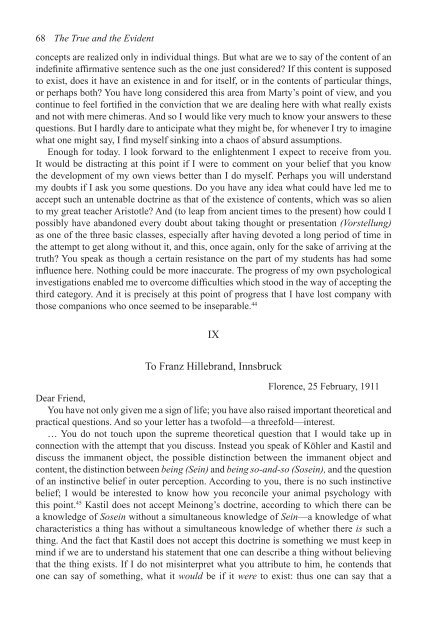Franz Brentano_The True and the Evident.pdf
Franz Brentano_The True and the Evident.pdf
Franz Brentano_The True and the Evident.pdf
You also want an ePaper? Increase the reach of your titles
YUMPU automatically turns print PDFs into web optimized ePapers that Google loves.
68<br />
<strong>The</strong> <strong>True</strong> <strong>and</strong> <strong>the</strong> <strong>Evident</strong><br />
concepts are realized only in individual things. But what are we to say of <strong>the</strong> content of an<br />
indefinite affirmative sentence such as <strong>the</strong> one just considered? If this content is supposed<br />
to exist, does it have an existence in <strong>and</strong> for itself, or in <strong>the</strong> contents of particular things,<br />
or perhaps both? You have long considered this area from Marty’s point of view, <strong>and</strong> you<br />
continue to feel fortified in <strong>the</strong> conviction that we are dealing here with what really exists<br />
<strong>and</strong> not with mere chimeras. And so I would like very much to know your answers to <strong>the</strong>se<br />
questions. But I hardly dare to anticipate what <strong>the</strong>y might be, for whenever I try to imagine<br />
what one might say, I find myself sinking into a chaos of absurd assumptions.<br />
Enough for today. I look forward to <strong>the</strong> enlightenment I expect to receive from you.<br />
It would be distracting at this point if I were to comment on your belief that you know<br />
<strong>the</strong> development of my own views better than I do myself. Perhaps you will underst<strong>and</strong><br />
my doubts if I ask you some questions. Do you have any idea what could have led me to<br />
accept such an untenable doctrine as that of <strong>the</strong> existence of contents, which was so alien<br />
to my great teacher Aristotle? And (to leap from ancient times to <strong>the</strong> present) how could I<br />
possibly have ab<strong>and</strong>oned every doubt about taking thought or presentation (Vorstellung)<br />
as one of <strong>the</strong> three basic classes, especially after having devoted a long period of time in<br />
<strong>the</strong> attempt to get along without it, <strong>and</strong> this, once again, only for <strong>the</strong> sake of arriving at <strong>the</strong><br />
truth? You speak as though a certain resistance on <strong>the</strong> part of my students has had some<br />
influence here. Nothing could be more inaccurate. <strong>The</strong> progress of my own psychological<br />
investigations enabled me to overcome difficulties which stood in <strong>the</strong> way of accepting <strong>the</strong><br />
third category. And it is precisely at this point of progress that I have lost company with<br />
those companions who once seemed to be inseparable. 44<br />
IX<br />
To <strong>Franz</strong> Hillebr<strong>and</strong>, Innsbruck<br />
Florence, 25 February, 1911<br />
Dear Friend,<br />
You have not only given me a sign of life; you have also raised important <strong>the</strong>oretical <strong>and</strong><br />
practical questions. And so your letter has a twofold—a threefold—interest.<br />
… You do not touch upon <strong>the</strong> supreme <strong>the</strong>oretical question that I would take up in<br />
connection with <strong>the</strong> attempt that you discuss. Instead you speak of Köhler <strong>and</strong> Kastil <strong>and</strong><br />
discuss <strong>the</strong> immanent object, <strong>the</strong> possible distinction between <strong>the</strong> immanent object <strong>and</strong><br />
content, <strong>the</strong> distinction between being (Sein) <strong>and</strong> being so-<strong>and</strong>-so (Sosein), <strong>and</strong> <strong>the</strong> question<br />
of an instinctive belief in outer perception. According to you, <strong>the</strong>re is no such instinctive<br />
belief; I would be interested to know how you reconcile your animal psychology with<br />
this point. 45 Kastil does not accept Meinong’s doctrine, according to which <strong>the</strong>re can be<br />
a knowledge of Sosein without a simultaneous knowledge of Sein—a knowledge of what<br />
characteristics a thing has without a simultaneous knowledge of whe<strong>the</strong>r <strong>the</strong>re is such a<br />
thing. And <strong>the</strong> fact that Kastil does not accept this doctrine is something we must keep in<br />
mind if we are to underst<strong>and</strong> his statement that one can describe a thing without believing<br />
that <strong>the</strong> thing exists. If I do not misinterpret what you attribute to him, he contends that<br />
one can say of something, what it would be if it were to exist: thus one can say that a
















